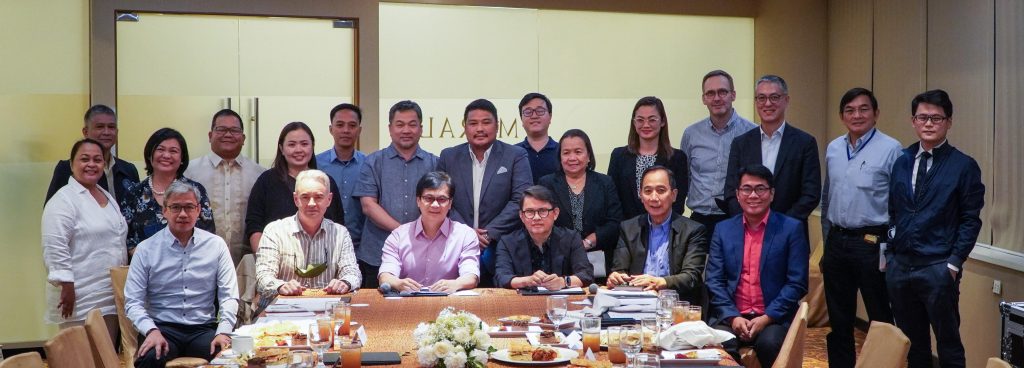
Concepcion: OCTA Survey Shows Many Pinoys Interested in Entrepreneurship
January 8, 2023
Sowing the seeds of mentorship
January 12, 2023
DILG Supports Kapatid Angat Lahat Agri Sector Program
Go Negosyo’s Kapatid Angat Lahat program for the agriculture industry received a big boost with the commitment of support from the Department of the Interior and Local Government (DILG). Go Negosyo founder Joey Concepcion thanked DILG Sec. Benhur Abalos for backing the private sector-led initiative Kapatid Angat Lahat for Agriculture Program (KALAP), which aims to help the country’s MSMEs in the agriculture sector by integrating them into the value chain of large corporations.
Concepcion explained that helping MSMEs, a bulk of whom can be found in the agriculture sector, will help generate more jobs for Filipinos, especially those in the countryside. “I think it’s about time we really pursue and create inclusivity in the Philippines, and one of the biggest ways we can do it is in the most difficult area, agriculture,” he said.
“We commit our department to this,” said DILG Sec. Abalos. He assigned DILG Asst. Sec. Odilon Pasaraba to the program for the meantime, and said an Undersecretary position might eventually be created specifically for the task. He added that National Irrigation Administration head and former Piddig mayor Eddie Guillen will also play a pivotal role.
The affirmation was made during a meeting between the DILG and private sector last Monday, January 09. The meeting was organized by Go Negosyo, and attended by executives from the agriculture sector, including Bounty Fresh, Harbest Agribusiness, Kennemer Foods, Lionheart Farms, LT Group, Nestlé Phils., Universal Leaf Phils., Yovel East Research, and the Cooperative Development Authority.
“Kapatid Angat Lahat tries to help the MSMEs by encouraging the big to come to the aid of the small. We already have proof that it works in areas like franchising, and that it is sustainable,” said Concepcion.
During the meeting, KALAP Senior Adviser and former Department of Agriculture Sec. William Dar proposed that a senior government official be designated to coordinate the food security program of LGUs. Furthermore, it was asked that food security be made part of the Seal of Good Local Governance assessment system of the DILG, and that the department should help mobilize and strengthen the extension units of all LGUs, who will then partner with farmers cooperatives in enhancing productivity. The group also asked for support in the business facilitation of various agriculture enterprises.
Sec. Abalos said he will see how food security can be incorporated into the Seal of Good Local Governance so as to incentivize LGUs, and asked the group for guidance on timetables and specific areas to address the request on extension services and coordinating with farmers cooperatives.
During the meeting, two private sector-led models in the coconut and tobacco industry were presented, showing how private companies can successfully implement innovative agriculture programs in their communities and transform their respective industries. Lionheart Farms Co-Founder and CEO Christian Moeller showed how the company was able to raise productivity among coconut farmers in Palawan using a model similar to nucleus estate farming, while Universal Leaf Philippines (ULP), under the leadership of Winston Uy, was able to turn around Ilocos’s tobacco industry to become an exporting powerhouse by using technology. In both cases, the companies worked closely with local government.
“The models presented here show how LGUs can partner and this could be a very good template,” said Sec. Abalos.
“That is why we sought the help of Sec. Abalos for KALAP. The cooperation of the mayors is needed in many aspects of this program,” Concepcion said. He cited the role of former Piddig, Ilocos Norte Mayor Guillen, who worked with ULP to revive the province’s tobacco industry, while the cooperation of Palawan Gov. Pepito Alvarez was credited as a key enabler in the success of Lionheart’s programs in the province.
“The experience of ULP and Lionheart prove that the cooperation of local government is a key element in the success of big-brother partnerships in helping our micro farmers,” said Concepcion. “They can provide the enabling environment for this to succeed.”
Moreover, a well-designed business model for agricultural programs is also seen as key in sourcing funding from banks and other financial and aid institutions. Furthermore, the success of these models is seen to encourage other big companies, and even LGUs, to adopt similar models of public-private sector cooperation in agriculture.
“When we first introduced Kapatid Angat Lahat in 2016, we saw that for MSMEs to grow and evolve from micro to small, small to medium, and medium to large, they need the three M’s of money, market and mentoring. These can come with the help of big-brother companies,” said Concepcion.

2/F RFM Corporate Center, Pioneer cor. Sheridan Sts. Mandaluyong City, Metro Manila, Philippines

